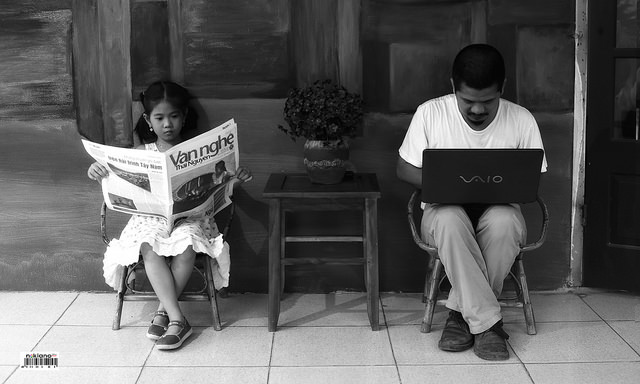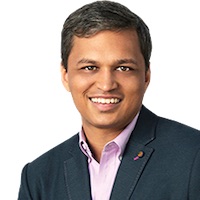
So many of us have difficult relationships with our parents.
When we harbor resentment towards our parents because of the way we were raised, we’re really just making things worse for ourselves.
From my work with hundreds of thousands of people all over the world, I know that this is a recurring experience that creates a deep lingering heaviness in people affecting them their entire lives.
My own experience has shown me the power of forgiveness. My mother worked so hard for us, she raised me alongside my grandmother while my dad showed up whenever he pleased. When my mom got sick and started having thyroid issues, my immediate reaction was to blame my dad—in my mind, he was never there to support her or us kids, so of course she got sick.
Later in life I called my dad and I apologized for how I treated him. His response was “I only ever played the role you needed me to play.”
That shook me into the realization that people are only ever doing what we need them to do for our own personal evolution. Today my dad is fully present in his role of grandfather to my four children—he’s pure love on steroids with them. Had I not allowed forgiveness into my heart, my children wouldn’t have this stable, loving man in their life. All too often, forgiveness is based on the limitations of other people’s actions.
Maybe we don’t want to forgive our parents because we’re waiting for them to change, to admit their wrongdoings and to be deserving of our forgiveness. It’s this pushing for our relationship to be different that creates suffering within us. We’ve put our own well-being into someone else’s hands.
When we’re children, we can’t help but do this. We can’t help but rely on others to meet our needs. As children we’re caught in this vulnerable place of dependence and it’s easy to remain stuck as we grow into adulthood and beyond.
It’s for this reason that forgiving the hurt caused by our parents is so hard. We store all of that pain in our bodies, and when it comes up, we feel triggered, angry, and resentful of the people who caused it.
If Freud was right about our partners being like our parents, then the foundational relationships with our parents depict how the rest of the relationships in our lives will play out. Our parents become the fundamental archetypes of male and female in our lives. If we don’t address the issues we have around them, we do ourselves a huge disservice in all of our future relationships.
Before we can move into forgiveness, a realization must be made that forgiveness isn’t dependent upon another person’s actions. Forgiveness is a profoundly transformational act of self-love—it has nothing to do with anyone else. Accessing true forgiveness within transforms the density and trauma we hold into compassion and grace. We can be empowered to achieve this regardless of how traumatic our respective childhoods were.
Is it ever too late to forgive?
It’s never too late to forgive anyone, but parents may just be the most difficult relationship to cultivate forgiveness in. Many of us will say that we can never forgive, that it’s too late, that the circumstances aren’t right but that’s not the authentic Self-speaking, it’s the conditioned self.
The self that makes all sorts of excuses to remain in suffering. The truth of our authentic Self, the divine within each of us, is that on a soul level we chose the parenting experience we had. It shaped us, and gave us self-knowledge that was incredibly difficult at the time but essential for our personal evolution.
And truthfully, compassion can flourish when we realize that we never met our parents as their authentic selves. We met them as their conditioning, with old school gender roles and the pressures that their day and age bombarded them with.
Breaking the Cycle of Unconscious Parenting
Today, conscious parenting is mainstream. Were it not for certain influential therapists, teachers, doctors and researchers having difficult childhoods, we likely wouldn’t have access to the abundance of information on conscious parenting like we do today. From pain, enlightenment has emerged.
Whether our parents have already passed or not, we can forgive them without them having to do anything and in turn cultivate love and acceptance within ourselves.
In our authentic selves, peace already exists.
Can we hold our parents hostage for the awareness they didn’t have?
Can we hold them hostage for how they were parented?
Can we hold them hostage for their own self-hate, which they didn’t understand how to process?
We cannot.
All we can do is break the cycle of abuse, a natural function of human evolution. We can ensure the next generation won’t be burdened by the same difficulties if those of us with difficult childhoods face and forgive, moving forward with greater consciousness and understanding.
We must disengage from the false external belief that we can change someone else’s behavior.
The more we remind ourselves of this, the more we love ourselves, the more we can transform the density around our childhood into courage and compassion. When and if we have children in the future, they won’t have the same burdens we did. Because we did the work that our parents couldn’t and we can initiate a wave of generational healing.
An Exercise in Forgiveness
Closing the eyes, we allow ourselves to enter into a still place within. Focus on flooding the body with peace, breathing deeply and starting to visualize our mother or father, whoever we had a difficult relationship with.
Visualize them as you remember them, and see yourself giving them a hug.
As you give your mother or father a hug, feelings will start to come up to the surface. Allow yourself to feel the unresolved density, witness the imprints within that need your attention.
Cultivate love and acceptance for whatever is coming up, whatever emotions arise, know that they are neither negative or positive, they just are.
Whenever we accept something energy can flow and density can dissipate. Relaxing into the emotions that come up will shift our vibrational state which in turn shifts our psychology and physiology.
The mind can’t tell the difference between that which is imagined and that which is real. When we embrace our parent, challenges and all, we can start to integrate our experiences. We can acknowledge that they are a part of us, or we can allow that part of us to fade away.
The choice is always ours.
Author: Panache Desai
Image: nokiano258vn at Flickr
Editor: Renée Picard






Read 36 comments and reply